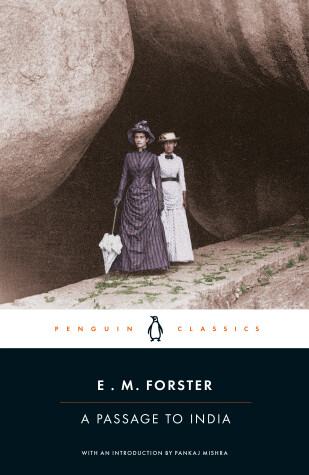
'His great book ... masterly in its prescience and its lucidity' ANITA DESAI
A compelling portrait of a society in the grip of imperialism, A Passage to India depicts the fate of individuals caught in the great political and cultural conflicts of their age. It begins when Adela and her elderly companion Mrs Moore arrive in the Indian town of Chandrapore, and feel trapped by its insular and prejudiced British community. Determined to explore the 'real India', they seek the guidance of the charming and mercurial Dr Aziz. But a mysterious incident occurs while they are exploring the Marabar caves, and the well-respected doctor soon finds himself at the centre of a scandal.
Edited by OLIVER STALLYBRASS with an Introduction by PANKAJ MISHRA
- ISBN10 014144116X
- ISBN13 9780141441160
- Publish Date 28 July 2005 (first published 1 March 1965)
- Publish Status Out of Print
- Out of Print 6 February 2022
- Publish Country GB
- Publisher Penguin Books Ltd
- Imprint Penguin Classics
- Format Paperback (B-Format (198x129 mm))
- Pages 416
- Language English
- URL https://penguinrandomhouse.ca/books/isbn/9780141441160
Reviews

Written on Aug 23, 2019

gmcgregor
Written on Aug 15, 2016
Since we see the story from his point of view during that section of the novel, we know he didn't touch her. He couldn't even find her! But what did happen in that cave that scared her so badly? And will he be convicted even though he's innocent? The Anglo-Indians, as the British administration expats refer to themselves, are deeply racist, and there's a great deal of consternation that there needs to be a trial at all. The incident stirs up a lot of enmity on the parts of both the British and the Indians, who come together despite their own religious divisions to support Aziz. The only Briton that supports Aziz is Fielding.
Racial divides and the inherent injustices of colonialism are the main themes, and there's nothing really new or interesting in how Forster presents them. In 1924, when the book was published, it was possibly pretty progressive (for context, the British didn't leave India until 1949), but in 2017, it's not going anywhere unexpected. What I found to be the most interesting angle on it from today's perspective is the relationship between Aziz and Fielding. It raises the question of what it means to be a good ally to an underprivileged group, and if there can ever be real friendship between people society holds as unequal. The book posits that as much as they like each other, the answer is ultimately no. Fielding stands by Aziz during the trial, but then seeks to keep him from suing for recompense from Quested...recompense he deserves, but will ruin her. Even though he's presented to us as a fair-minded and fundamentally decent person, Fielding can't help but let his own perspective as a member of the privileged group drive his thinking, and that undermines his ability to really understand where Aziz is coming from.
Honestly, though, I didn't find much to like here. Coming at it from the world of now, the themes are tired and have been done before and better. Forster doesn't have especially lovely prose, nor does he create particularly well-drawn or resonant characters. In its time, it was a major work, but I didn't find anything all that compelling about it. I read it really quickly not because I liked it, but because I wanted to get through it and go on to something more interesting.
